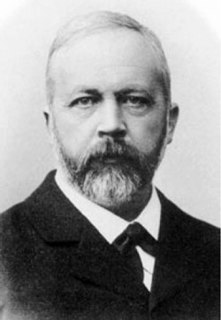A Quote by Julius Wellhausen
A judgment pronounced in accordance with the facts can therefore assign to it an historical place only within that movement of reformation which was brought to a victorious issue by King Josiah.
Quote Topics
Related Quotes
All knowledge that is about human society, and not about the natural world, is historical knowledge, and therefore rests upon judgment and interpretation. This is not to say that facts or data are nonexistent, but that facts get their importance from what is made of them in interpretation… for interpretations depend very much on who the interpreter is, who he or she is addressing, what his or her purpose is, at what historical moment the interpretation takes place.
Dialectical logic undoes the abstractions of formal logic and of transcendental philosophy, but it also denies the concreteness of immediate experience. To the extent to which this experience comes to rest with the things as they appear and happen to be, it is a limited and even false experience. It attains its truth if it has freed itself from the deceptive objectivity which conceals the factors behind the facts - that is, if it understands its world as a historical universe, in which the established facts are the work of the historical practice of man.
[The scientist] believes passionately in facts, in measured facts. He believes there are no bad facts, that all facts are good facts, though they may be facts about bad things, and his intellectual satisfaction can come only from the acquisition of accurately known facts, from their organization into a body of knowledge, in which the inter-relationship of the measured facts is the dominant consideration.
Rely upon your own judgment; be true to your own conscience; follow the light that is within you; all outward lights are so many will-o'-the-wisps. There will be those who tell you that you are foolish; that your judgment is faulty; that your conscience is all awry, and that the light within you is darkness; but heed them not. If what they say is true, the sooner you, as a searcher of wisdom, find it out the better, and you can only make that discovery by bringing your powers to the test. Therefore, pursue your course bravely.
What is accurately portrayed is the rich humanity not just of Martin Luther King but of the movement, which was a multiracial movement. You had blacks and whites coming together and sacrificing, organizing and mobilizing the world. That's the first time we've had collective action put at the center of any kind of portrayal of Martin King on the screen.
Governments which have a regard to the common interest are constituted in accordance with strict principles of justice, and are therefore true forms; but those which regard only the interest of the rulers are all defective and perverted forms, for they are despotic, whereas a state is a community of freemen.
Plainly, this unwillingness to give ground even on unimportant disagreements is the symptom of some deepseated insecurity, as was my one-time fondness for making teasing remarks (which I amended when I read Anthony Powell's matter-of-fact observation that teasing is an unfailing sign of misery within) and as is my very pronounced impatience. The struggle, therefore, is to try and cultivate the virtuous side of these shortcomings: to be a genial host while only slightly whiffled, for example, or to be witty at the expense of one's own weaknesses instead of those of other people.


































